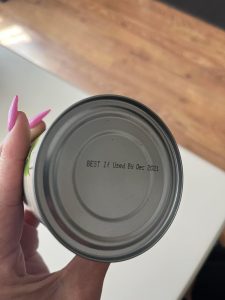
- Eggs: Eggs are often fine to eat three to five weeks after purchase. You can check their freshness by placing them in a bowl of water—if they sink, they’re still good.
- Meat and Poultry: Refrigerated meat and chicken can remain safe for up to two days beyond the “Sell By” date. If frozen, meat can last much longer, often months or even years, depending on storage conditions.
- Milk: As long as it smells and looks normal, milk can often be used for up to one week after the “Best if Used By” date.
- Dry Goods: Items like rice, pasta, and flour can last for months or even years if stored properly. These foods don’t spoil easily and can be kept in airtight containers.
- Canned Goods: Canned foods are incredibly durable. As long as the can isn’t damaged or bulging, the contents will typically remain safe to eat for years.
- Frozen Foods: Even though the quality of frozen food may degrade over time, they are safe indefinitely if kept at 0°F (-18°C) or lower.
Signs of Spoilage to Watch Out ForWhile many foods remain safe to eat after their expiration dates, there are still signs of spoilage to look for. Mold, unusual odors, strange textures, or an off-taste are all indicators that food has gone bad. Rather than relying solely on expiration dates, it’s often more reliable to use your senses to determine if food is still good.
How Proper Storage Can Extend Shelf LifeOne of the best ways to prevent food waste is by storing food properly. Here are some tips for extending the shelf life of your groceries:
- Refrigeration: Keep your fridge temperature at or below 40°F (4°C). This helps slow bacterial growth and keeps food fresh longer.
- Freezing: For long-term storage, freeze foods at 0°F (-18°C) or lower. Freezing effectively halts bacterial growth and preserves food for extended periods.
- Airtight Containers: Use airtight containers to store dry goods like flour, rice, and pasta. This helps keep moisture and pests out, ensuring a longer shelf life.
Conclusion: Focus on Food Quality, Not Just Expiration DatesIn summary, food expiration dates are more about quality than safety. While it’s important to use food before it loses its best flavor or texture, there’s no need to panic if it’s past the date on the package. By learning to properly interpret these dates, store food correctly, and rely on your senses, you can reduce food waste without sacrificing safety or quality. So next time you’re thinking of tossing that container of yogurt or that loaf of bread, give it a second look—it might still be perfectly good to eat!